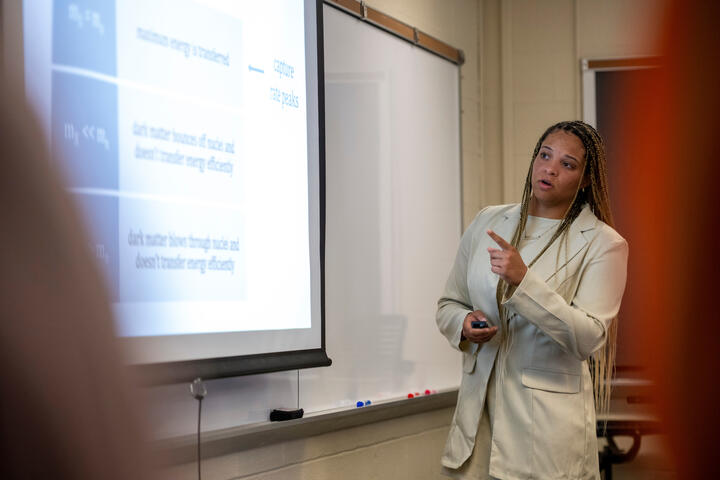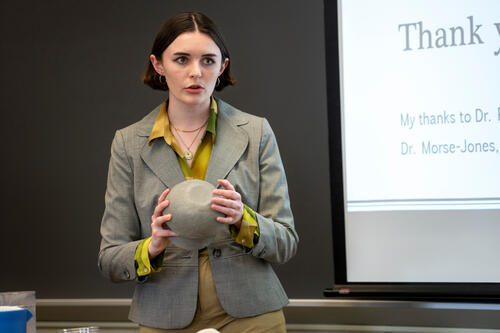
Student Learning Outcomes
At Hood College, we are committed to teaching excellence. Program goals and learning outcomes identify what we expect students to learn, think critically about and accomplish in their courses and programs of study at both the undergraduate and graduate levels. We believe an integrated learning approach that combines a strong grounding in the liberal arts with advanced study in the major and opportunities for internships and research initiatives is the best way to prepare students for lives of purpose and civic engagement.
Graduates earning a bachelor’s degree in art and archaeology with a concentration in archaeology from Hood College,
Will demonstrate an understanding of the history of archaeology and its impact on the methods and goals of the discipline through:
- Knowledge of the historical development of archaeology as a discipline, and its connection to phases of European political and social history.
Will demonstrate an understanding of the methods of archaeology through:
- Knowledge of archaeological methods and interpretive models, through in- depth instruction, with emphasis on theory and interpretation;
- Knowledge of archaeological methods and interpretive models, through hands-on experience in research methods (excavation, survey, and/or lab); and
- Knowledge of archaeological materials, methods, and interpretive models, through hands-on experience in photography and ceramic production.
Will learn the application of archaeology and related disciplines to the reconstruction of ancient societies through:
- Reconstruction of ancient societies, through archaeological and art historical research;
- Reconstruction of ancient societies, through historical, religious, and/or literary research; and
- Extended research in and critical analysis of an archaeological question or topic, including directed research using primary and secondary sources, and presenting findings both orally and in writing.
Graduates earning a bachelor’s degree in art and archaeology with a concentration in art history from Hood College,
Will demonstrate the ability to identify and/or analyze the styles and subjects of art (including architecture) within their historical and cultural contexts, from antiquity to the present through:
- Identify and/or Analyze Art/Architecture before 200 CE;
- Identify and/or Analyze Art/Architecture from 200 - 1400 CE;
- Identify and/or Analyze Art/Architecture from 1400 - 1850 CE; and
- Identify and/or Analyze Art/Architecture from 1850 onwards.
Will demonstrate an ability to engage with art historical methods, theory, and criticism through:
- Analyze critical texts or literature;
- Use key terms, methods, and/or theories; and
- Analyze a work of art and/or architecture using critical theory and/or methodology.
Will demonstrate the ability to conduct formal research in art history through:
- Use primary and secondary sources;
- Present findings/research via formal oral presentations; and
- Present findings/research via formal academic papers.
Graduates earning a bachelor’s degree in art and archaeology with a concentration in studio art and art education from Hood College,
Will gain a broad knowledge base of a variety of studio art media, develop technical skills, gain an awareness of historical movements, and comprehend universal aesthetic concepts through:
- Demonstrating basic technical skills, especially drawing and design; through classroom exercises, project critiques and portfolio reviews; and
- Understanding the elements of art and the principles of design, demonstrated through critical, individual and group discussions. In the evaluation of projects and during portfolio reviews, progress of student’s artwork will be assessed, as well as their ability to respond to feedback.
Will develop the ability to observe, cultivating analytical and creative thinking skills through:
- Demonstrating the ability to communicate ideas verbally, through mark- making and other basic formal technical skills; and
- Presenting work and concepts, during one on one discussions with the instructor, group discussions, and project critiques will allow students to verbalize their defense of ideas, as well as demonstrating an ability to receive and put forth constructive feedback.
Will develop a process for articulating aesthetic ideas and the ability to communicate their personal aesthetic intentions visually in their art work, verbally, and in written form through:
- Demonstrating accountability and awareness of all aspects of their artwork and methodology, during the presentation of artwork and developing concepts;
- Demonstrating an ability to describe and defend ideas, and to deconstruct the methods and validity of artwork; and
- Demonstrating knowledge articulated through concept development, using sketches, color roughs, maquettes, writing, and other methods to present ideas.
Will gain purpose and a sense of responsibility of the role an artist in society plays and how an artist effects societal change through:
- Demonstrating the knowledge of a wide range artists/artwork, past and present, in the student’s ability to recognize artwork in context. Understanding an artist’s impact and/or relationship to society, and how a student’s own work relates to the ideas, concerns and methodologies of past artists; and
- Understanding, interpreting and expanding on ideas and methods of both artists and critics through research, discussion and writing.
Will analyze formal design issues both literally and conceptually through:
- Demonstrating strong understanding of aesthetics, and an awareness of regional versus universal associations that ultimately manifest in projects and during critiques; and
- Demonstrating evidence of good design/composition and an understanding of the important role context plays, through composition analysis, rigorous critical discussions, and artist talks.
Will gain the ability to seek the challenge of higher learning environments, become confident artists, intellectually sound risk takers, career oriented professionals, and empowered citizens meeting the challenges of today’s society through:
- Through formal presentation of artwork and concepts during critiques and portfolio reviews;
- Demonstrating a high level of understanding and skill with art media. Recognized through the presentation of artwork, during group critiques and individual portfolio reviews;
- Developing a series of artwork for a senior exhibition; and
- Fully developing the senior exhibition, including self- promotion, concept development, artist statement, artist biography, resume, a complete visual identity, including a website, project production plan, budget, and an artist talk. Work and knowledge will be evaluated during a final portfolio review. Student is also evaluated via the exhibition design of their work, gallery talk that took place during the opening reception and through a portfolio/gallery book.
Graduates earning a bachelor’s degree in art therapy from Hood College:
- Show proficiency in the foundational learning content areas of psychology and studio art.
- Develop working knowledge of the foundational theories and content of developmental psychology.
- Demonstrate working knowledge of the foundational theories and content of abnormal psychology.
- Demonstrate studio art proficiency in two-dimensional art media techniques and processes.
- Demonstrate studio art proficiency in three-dimensional art media techniques and processes.
- Demonstrate familiarity with the major concepts, theoretical perspectives, techniques, and historical trends in art therapy.
- Describe key concepts, principles, historical trends, and overarching themes in art therapy.
- Distinguish among the therapeutic benefits of various art processes and media, strategies, and interventions as well as their applicability to treatment for individuals, groups, and/or families.
- Understand and apply the ethical principles and professional codes of practice for art therapists as they apply to clinical practice, communities, and self.
- Show understanding of the ethical principles and professional codes of practice for art therapists.
- Recognize the legal, ethical, and cultural considerations required for conducting art therapy research.
- Recognize that art therapy uses a multicultural perspective and considers how specific values, beliefs, and actions are influenced by a client’s race, ethnicity, nationality, gender, religion, socioeconomic status, political views, sexual orientation, geographic region, physical capacity or disability, and historical or current experiences within the dominant culture.
- Recognize and show working knowledge of the use of imagery, creativity, symbolism, and metaphor to express challenges and strengths as well as promote growth and well-being.
- Demonstrate knowledge of the principles of human development, artistic and creative development, human sexuality, gender identity development, family life cycle, and psychopathology to the assessment and treatment of clients.
- Articulate clinical theory and applied practice through written and oral communication across broad interdisciplinary communities.
- Comprehend and apply creative and aesthetic processes in the context of creative arts therapy theory and practice.
Study by Mia Watkins, advisor Natalia Kormeluk
Are you ready to say Hello?
Choose a Pathway
Information will vary based on program level. Select a path to find the information you're looking for!

